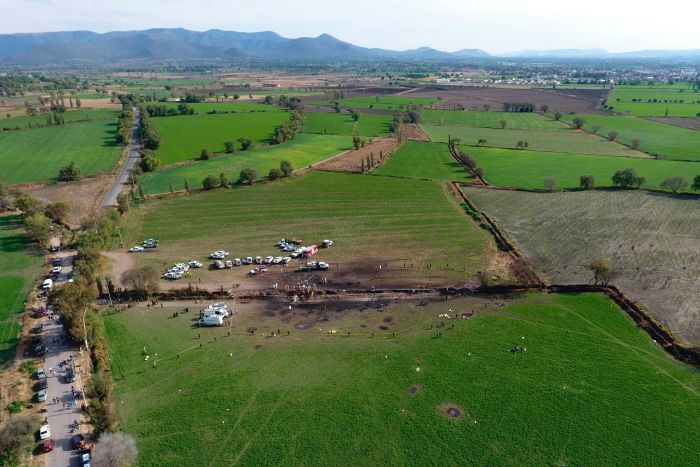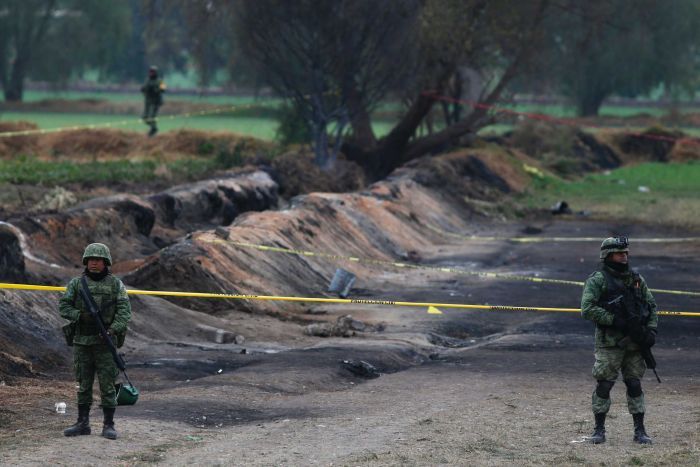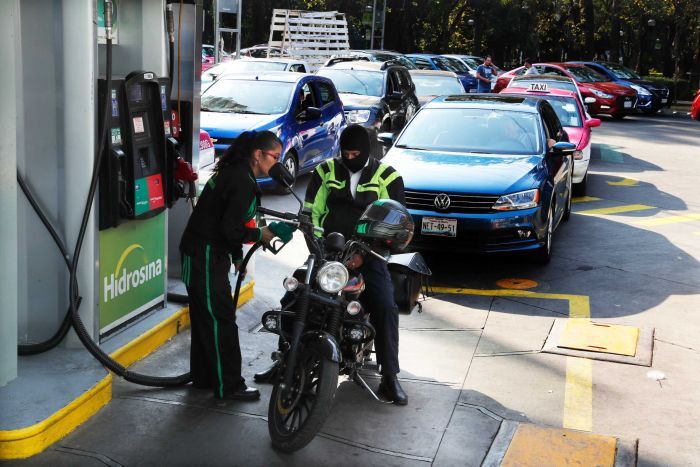
Mexico's fuel policies face scrutiny after deadly pipeline explosion
Updated
A blast at a fuel pipeline in Mexico that killed at least 85 people has put renewed attention on the Government’s strategy to stop fuel theft, with some relatives saying fuel shortages stemming from the plan led victims to risk their lives.
Key points:
- Up to 800 people flocked to the pipeline when it began spitting out gasoline
- The country is experiencing fuel shortages, driven by anti-theft policies
- Thieves siphon off around $US3 billion worth of fuel each year from state pipelines
Fuel thieves punctured the Tula-Tuxpan pipeline a few miles from one of Mexico’s main refineries on Friday.
Up to 800 people flocked to fill plastic containers from the 7m fuel geyser that ensued, officials say. A couple of hours later, it erupted in flames in a powerful explosion.
Half a dozen people interviewed by Reuters on Saturday said their relatives went to the leaking duct in Tlahuelilpan district in Hidalgo state because they struggled to find fuel elsewhere, and were desperate to fill up cars to get to work or run their farms.
“A lot of innocent people came here, perhaps their car didn’t have enough gasoline for tomorrow, and they said, ‘I’m just going to go for a few litres’,” said farmer Isidoro Velasco, 51.
Mr Velasco was waiting for news of his nephew, Mario Hidalgo, who he believed was likely killed. Mr Hidalgo would have turned 34 on Saturday.

Photo:
The ground around the pipeline has been left scorched, as forensic investigators comb the site. (AP: Alexis Triboulard)
Late last month, President Andres Manuel Lopez Obrador launched a program to shut down an illegal fuel-distribution network that siphons off about US$3 billion ($4.19 billion) worth of fuel annually from state oil firm Pemex.
The plan, which called for shutting pipelines targeted by thieves, led to widespread fuel shortages in central Mexico this month, including in Hidalgo, north of Mexico City.
The pipeline in Tlahuelilpan district had only just come back into service on Friday, after being offline for nearly four weeks.
Why is there so much fuel theft?
Fuel theft has been a problem in Mexico for decades but it has been growing in recent years.
Mexico’s motor fuel market is a juicy target for thieves. It is the world’s sixth biggest, according to energy ministry data, featuring a total daily demand of nearly 1.18 million barrels of petrol and diesel.
Thieves are currently siphoning off the equivalent of around one-fifth of total national fuel consumption, about 150,000 barrels per day (bpd) according to Reuters calculations based on official data.
They then re-sell mostly to complicit gas stations. Pemex documented more than 12,500 illegal taps to its fuel pipeline network during the first 10 months of 2018, more than in the previous year.

Photo:
The pipeline had been burst by a petrol thief earlier in the day before it caught fire. (AP: Claudio Cruz)
The Mexican Government’s lack of attention has allowed organised groups to open clandestine taps along Pemex’s main pipelines.
Theft escalated in recent years following reforms to the country’s oil sector by previous president Enrique Pena Nieto, who liberalised the industry for foreign investment.
In turn, retail prices rose, giving criminal cartels an opportunity to undercut those prices through black-market sales.
What is the Government doing?

Photo:
The policy of closing down major pipelines has led to widespread fuel shortages. (AP: Marco Ugarte)
Since late December, Mr Lopez Obrador has closed six major pipelines where criminal gangs and other thieves have siphoned off stolen fuel worth billions of dollars.
Distribution was instead switched to trucks, but that change has caused delivery delays and long lines at gas stations, threatening to crimp the economy and hurt the President’s popularity if shortages persist.
The veteran leftist won a landslide election victory on promises to root out endemic corruption, strengthen ailing national oil company Pemex and ensure stable fuel prices.
Polls show the measures have until now enjoyed fairly broad public support, despite the difficulties and long lines at petrol stations.
The tragedy in Tlahuelilpan, however, has brought renewed scrutiny of the strategy.

Photo:
Mexico’s President is not backing down from his fuel policies, despite the explosion. ((AP Photo/Claudio Cruz))
Mr Lopez Obrador has repeatedly been asked why soldiers deployed to guard the duct did not chase people away from the leak, and how quickly the pipeline was shut down after Pemex detected the rupture.
He said on Sunday the disaster had not weakened his resolve to fight fuel theft.
“I won’t take a single step backwards,” he told a press conference.
“I can only offer people apologies, if this action causes sacrifices, harm and inconveniences. But we have to do it.”
He said he hoped supply would normalise next week, as Mexico buys more tanker trucks for distribution by road.
Reuters/AP
Topics:
First posted
